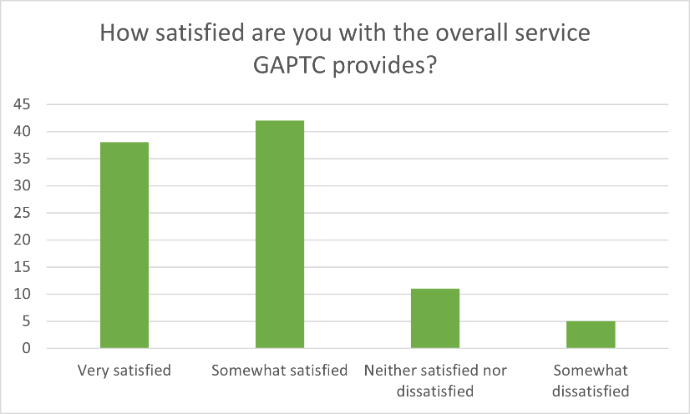2024 Member Survey: Feedback and Responses
Overview of Findings
The 2024 GAPTC Member Survey provided valuable insights into the needs, priorities, and challenges faced by our member councils. The responses highlighted areas where GAPTC is performing well and identified opportunities for further support and development.
Overall, satisfaction with GAPTC's services remains high, with most respondents indicating they are either very satisfied or somewhat satisfied with the support provided. However, some councils expressed dissatisfaction, primarily relating to specific services such as training accessibility, networking opportunities, and engagement with external organisations.
Key areas for improvement include expanding awareness of GAPTC’s existing services, enhancing training opportunities, fostering greater collaboration between councils, and improving communication regarding legal and HR support. Additionally, several councils requested more assistance with planning matters, climate action, and funding access.

Detailed Findings
A strong majority of respondents reported being either very satisfied or somewhat satisfied with GAPTC’s overall service. A small number of councils expressed dissatisfaction, which was largely linked to specific service areas such as training and legal advice. GAPTC will continue to engage with members to understand and address these concerns.
The survey revealed varied engagement with GAPTC’s training programme, with some councils attending monthly or quarterly, while others engage occasionally or not at all. The main barriers to participation include cost, scheduling conflicts, and a perceived lack of relevance for smaller councils.
To support greater participation, GAPTC is currently reviewing its full training offer. This includes developing new training modules, trialling them, and researching and interviewing new trainers. Additionally, GAPTC is creating tailored training materials to ensure valuable takeaways and in-session engagement.
As part of this expansion, GAPTC will launch a Legionella Compliance course in April and introduce Council as Employer training. A bespoke Code of Conduct session has also been developed, which takes place at the council’s premises. Furthermore, GAPTC is reviewing other County Associations' training offers to identify ways to improve and enhance its own programme.
Information on upcoming training opportunities can be found HERE.
While many councils benefit from GAPTC’s networking sessions, others reported infrequent participation or lack of awareness. GAPTC will enhance communication about these events and is already exploring new formats to encourage wider engagement. One significant change is the integration of clerks and councillors into a single monthly session on a specific topic. This adjustment responds to feedback indicating that clerks find councillor-only sessions valuable and do not want to miss out on the information shared in these discussions.
Additionally, these networking sessions help address cost concerns related to training. Although advertised as networking events, they include substantial learning content and are completely free of charge. To better reflect their value, GAPTC will rename these sessions as 'Information Sharing' events. Recent sessions have gained significant traction, with as many as 85 clerks and councillors attending due to the relevance and popularity of the topics covered. GAPTC will enhance communication about these events and explore new formats to encourage wider engagement. These sessions provide invaluable opportunities for councils to share experiences, learn from one another, and collaborate on shared challenges.
Find out more about upcoming networking sessions, and catch up on sessions you have missed HERE.
A significant number of councils regularly use GAPTC’s legal advice service, usually via the website enquiry service, but some were unaware of it or unsure how to access support. The service provides guidance on governance, employment matters, and statutory obligations. Councils needing legal support are encouraged to use the online advice ticket system or contact GAPTC directly for assistance HERE
Survey responses indicated that awareness of GAPTC’s HR support service is relatively low. This service provides councils with expert advice on employment matters, contracts, grievance procedures, and performance management. Further information is available HERE.
Interest in collaboration with neighbouring councils was mixed, with some councils actively working together while others reported little engagement. When asked about the potential introduction of HUBs—clusters of 8-10 neighbouring councils to provide localised support—there was strong interest in peer support, training, and shared resources. GAPTC has begun the process of allocating HUBs based on input from clerks and councillors at recent engagement sessions. More information and the draft HUBs can be viewed HERE. The West Forest Councils Clerks Group have already met and discussed several key issues. Read a blog about that first meeting HERE.
Priorities for the Next 12 Months
Expanding and improving training opportunities, particularly in financial management, governance, and councillor development. See above for more detail about the work we are already putting in to enhance this important service.
Providing greater support on planning and development matters, including updates on policy changes and planning law. GAPTC has already recognised this as a priority and recently hosted its first information-sharing session with all members. During this session, councils received a free briefing on the latest NPPF revisions and their impact on town and parish councils. Additionally, GAPTC has launched a planning-specific newsletter to keep members informed about key developments. Keep an eye on our services menu for a bespoke Planning page. You will also be able to access it via the Knowledge base in the Member Portal.
Assisting councils in understanding and navigating local government devolution, including the transfer of services and assets, partnership opportunities, and governance structures. GAPTC has created a Devolution page under the Services tab on its website to keep members up to date and provide relevant resources. We are creating a bespoke Devolution Page HERE, which can also be accessed via the Knowledge base HERE.
Assisting councils in responding to climate challenges, including guidance on reducing carbon footprints and implementing sustainability initiatives.
GAPTC has developed a specialised training module titled The Power of Local Climate & Biodiversity Action. This two-hour online session is designed exclusively for GAPTC members and provides practical strategies for town and parish councils to take effective climate and biodiversity actions at a hyper-local level.
The training explores innovative solutions, shares best practices, and equips councils with the knowledge to drive meaningful reductions in CO2 emissions. These sessions have been developed to empower councils to take a leading role in environmental sustainability.
In addition to this training, GAPTC will be launching a Climate Change Toolkit at the end of March. This toolkit will provide councils with essential resources to take meaningful action on climate issues. The toolkit will be accompanied by interactive, user-friendly website pages to ensure easy access to practical guidance.
Furthermore, GAPTC will soon have a thermal imaging camera available for members to borrow and use within their communities. This tool will help councils and residents identify energy inefficiencies in buildings, supporting efforts to reduce carbon footprints and improve energy efficiency at the local level.
Members are encouraged to register for the training and make use of these valuable resources to drive forward climate initiatives within their communities.
Strengthening engagement opportunities for councils to share best practices and collaborate on shared challenges. In response to this, GAPTC now hosts monthly online sessions where a clerk or councillor presents on a topic of interest, followed by an interactive discussion and Q&A. These sessions facilitate knowledge sharing and provide councils with insights into best practices. Find out more HERE.
Additionally, GAPTC hosts an annual Christmas in-person event, featuring a guest speaker and dedicated discussion time, allowing clerks and councillors to network and strengthen relationships with their peers.
The introduction of HUBs further supports this need by fostering localised peer support and encouraging councils to collaborate on shared challenges. More details on the HUBs initiative can be found on the GAPTC website HERE.
Conclusion
The 2024 Member Survey has provided GAPTC with clear guidance on where to focus its efforts in the coming year. By expanding awareness of existing services, improving accessibility to training, strengthening collaboration opportunities, and addressing key concerns raised by members, GAPTC aims to ensure that every council has the support it needs to thrive.
Further details on GAPTC’s services and upcoming initiatives can be found in our services pages and by accessing the member portal. We thank all councils who participated in the survey and look forward to implementing the improvements that have been identified.
